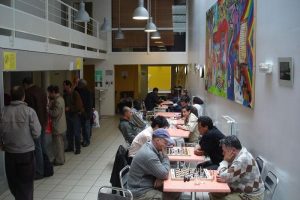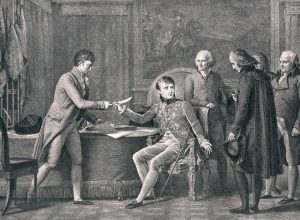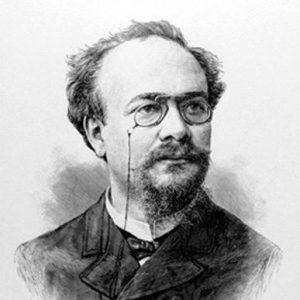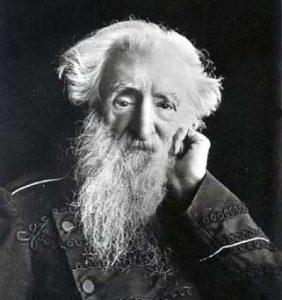The origin of the CASP
The “Articles Organiques” of 1802 stipulated that groups of Protestant churches within a consistory could undertake charitable deeds This was precisely what parishes in the Paris consistory of the Reformed Church did, each taking care of its “poor” with mutual support or help of their Diaconate.
In 1816, during the “Restauration” period, the parishes created a “Délégation générale des diaconats” (General Delegation of Diaconates). It was meant to provide support for poor diaconates, to help find housing for the disabled and elderly.
The 1905 law separating the Church from the State compelled churches to restrict their activities solely to worship. The Reformed parishes formed church societies, most of which became separate charitable organisations, now called mutual aid or diaconate societies.
A few months before the law was passed, the Paris Consistory had founded the Charity Association of the Paris Reformed Protestants whose headquarters were in the “Oratoire du Louvre” Temple. It was officially recognised in 1906 and was intended to help Reformed Protestants in Paris and in the Greater Paris area and to supply all kinds of social services to Protestant families. It received state funds and could pay some workers.
The “General Delegation of Diaconates” did not disappear altogether. In 1907 it was named the General Delegation of Reformed Diaconates of the Seine region : a society of diaconates without any legal status. Its resources came from the Charity Association, two collections per year and gifts after special services in the churches of the Paris consistory.
In 1956 the Paris Consistory, the Charity Association and the General Delegation founded the Centre d’Action Sociale (Social Action Centre), or CAS, to mitigate the structural failures of the General Delegation of the Diaconates, and also to be able to provide a “welfare officer” for local Churches. The CAS was a sort of regional diaconate, without any legal status.
In 1968, the Charity Association changed its statutes and became the Mutual Aid Association.
In 1979, the regional synod of the Eglise Réformée de France or ERF (French Reformed Church) wanted the CAS to become a training and information organisation. Its aim was to be a working group not an “on the ground” social action organisation.
Following the creation of CAS, three different associations existed. Reforms were needed, and they were accepted by CAS at the general meeting of January 1980. In May 1981, the Mutual Aid Association replaced CAS and became the Centre d’Action Sociale Protestant en region parisienne or CASP-RP (Protestant Social Action Centre for the Paris Area). While still being officially recognised, the General Delegation disappeared, and only one association remained.
CASP immediately turned its social action towards non-protestants. It received public funds. Confronted with new forms of distress, it expanded its activities and set up specialised structures.
The activities of CASP
Since 1981 CASP has expanded, diversified its activities and become more professional.
The number of paid staff has grown from 75 in 1996 to 240 in 2006, not forgetting a hundred or so voluntary workers.
The traditional activities of CASP are in housing. In 2006 for instance :
- Emergency shelter in 4 centres : one shelter for homeless men, another one for homeless men currently undertaking professional training, one shelter for single women who have a child or are pregnant, and one shelter for homeless people discharged from hospital ;
- Housing for professional trainees in 3 specific hostels managed by CASP and a reception service in hostels. These provide intermediate housing between emergency shelters and long-term housing.
In 2004, CASP offered 1.7 million nights of shelter.
In all cases, CASP offers appropriate and personalised social support.
For families seeking asylum CASP runs :
- one housing centre opened in 1999,
- one reception centre created in 2000 for families waiting for official refugee status, to help them with social and administrative matters.
In addition, CASP has also opened a day centre : “the House in the Street”, and it supports each person receiving the Revenu Minimum d’Insertion or RMI (the minimum Job-Seeker’s Allowance).
CASP tries to provide concrete support for the most destitute while respecting their dignity and their conscience. CASP has centred its activities in Paris but wants to extend them to the suburbs. 97% of CASP’s revenue comes as subsidies from public authorities. It endeavours, using novel methods, to increase its own resources to meet current needs.
Confronted with the distress of the people they welcome, CASP thinks it should also witness, challenge and communicate the faith.
Links with Protestantism
At its creation, the Charity Association’s statutory aim was to help Reformed Protestants. After the Second World War social help from the State began, while the Reformed Protestants enjoyed relative economic prosperity and few needed help.
Should the Association stick to its aim, or should it respond to the dire needs of non-Protestants living on the streets ? The question was raised after the first oil crisis in 1973 when the Association started to take in jobless people, immigrants or victims of redundancy.
The change in the CASP statutes was approved in 1981. The aim of CASP is to “welcome, help, advise, support, and back up those who turn to them for moral, psychological, judicial, material, economic or spiritual help, whatever their religion, race, ideology or nationality”.
Although CASP is a lay association, its statutes allow for the presence of members of the Paris regional council of the ERF on its board of directors. Thus the links with the ERF have been kept but those with the diaconates have been loosened. However, for several years, conscious of its expansion throughout the Protestant world, CASP has tried to renew its links with the Diaconates. It has maintained regular contacts with the Mutual Aid Associations of Protestant churches in the Paris region, especially Reformed ones, as well as with the Diakonia of the Paris area ERF and the Fédération de l’Entraide Protestante (the Protestant Mutual Aid Federation).
As for the Diaconates, some are members of CASP, make donations to it or welcome people sent by CASP for Sunday lunch.









